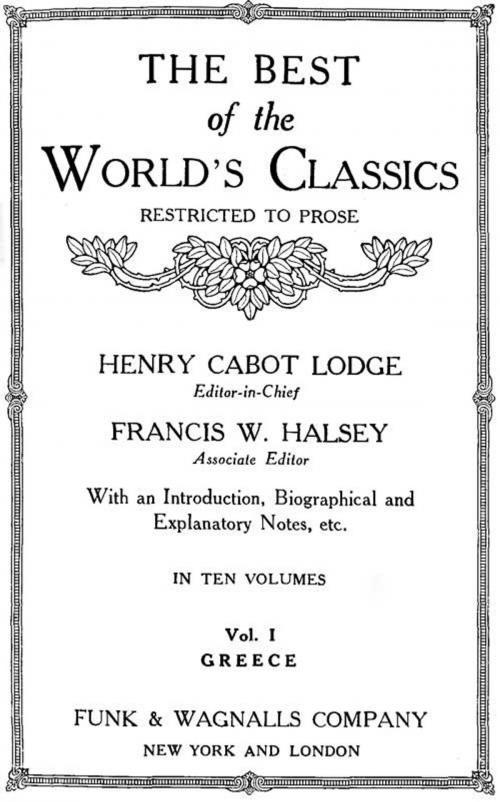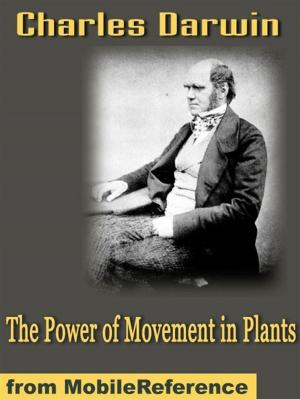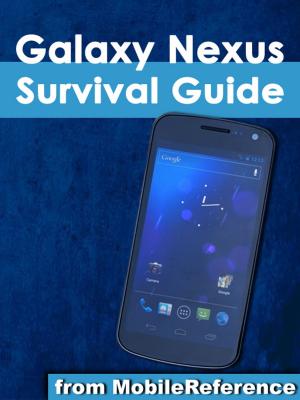The Best Of The World's Classics (Restricted To Prose) Volume I - Greece: 484 B.C.-200 A.D. (Mobi Classics)
Fiction & Literature, Literary Theory & Criticism, Classics| Author: | Henry Cabot Lodge (Editor) | ISBN: | 9781605012773 |
| Publisher: | MobileReference | Publication: | January 1, 2010 |
| Imprint: | MobileReference | Language: | English |
| Author: | Henry Cabot Lodge (Editor) |
| ISBN: | 9781605012773 |
| Publisher: | MobileReference |
| Publication: | January 1, 2010 |
| Imprint: | MobileReference |
| Language: | English |
This is an electronic edition of the complete book complemented by author biography. This book features a table of contents linked to every chapter. The book was designed for optimal navigation on the iPad, Nook, PDA, Smartphone, and other electronic readers. It is formatted to display on all electronic devices including eReaders, Smartphones and other Mobile Devices with a small display.TABLE OF CONTENTS: Introduction. By Henry Cabot Lodge. Herodotus-(Born probably in 484 b.c., died probably in 424.) I: Solon's Words of Wisdom to Crœsus. (From Book I of the "History." Translated by Rawlinson) II: Babylon and Its Capture by Cyrus. (From Book I of the "History." Translated by Taylor) III: The Pyramid of Cheops. (From Book II of the "History." Translated by Rawlinson) IV: The Story of Periander's Son. (From Book III of the "History." Translated by Rawlinson) Thucydides (Born about 471 b.c., died about 401.) I: The Athenians and Spartans Contrasted. (From Book I of the "Peloponnesian War." Translated by Benjamin Jowett) II: The Plague at Athens. (From Book II of the "Peloponnesian War." Translated by Benjamin Jowett) III: The Sailing of the Athenian Fleet for Sicily. (From Book VI of the "Peloponnesian War." Translated by Benjamin Jowett) IV: Completion of the Athenian Defeat at Syracuse. (From Book VII of the "Peloponnesian War." Translated by Benjamin Jowett) Xenophon I: The Character of Cyrus the Younger. (From the "Anabasis." Translated by J. S. Watson) II: The Greek Army in the Snows of Armenia. (From the "Anabasis." Translated by Watson) III: The Battle of Leuctra. (From Book VI of the "Hellenica." Translated by Watson) IV: Of the Army of the Spartans. (From the treatise on "The Government of Lacedæmon." Translated by: Watson) V: How to Choose and Manage Saddle Horses. (From the treatise on "Horsemanship." Translated by Watson) Plato I: The Image of the Cave. (From the "Republic." Translated by Benjamin Jowett) II: Good and Evil. (From the "Protagoras." Translated by Benjamin Jowett) III: Socrates in Praise of Love. (From the "Symposium." Translated by Benjamin Jowett) IV: The Praise of Socrates by Alcibiades. (From the "Symposium." Translated by Benjamin Jowett) V: The Refusal of Socrates to Escape from Prison. (From the "Crito." Translated by Benjamin Jowett) VI: The Death of Socrates. (From the "Phædo." Translated by Benjamin Jowett) Aristotle I: What Things are Pleasant. (From Book I of the "Rhetoric." Translated by Buckley) II: The Life Most Desirable. (From Book VII of the "Politics." Translated by Walford) III: Ideal Husbands and Wives. (From Book I of the "Economics." Translated by Walford) IV: Happiness as an End of Human Action. (From Book X of the "Nicomachean Ethics." Translated by Browne) Polybius I: The Battle of Cannæ. (From Book IV of the "Histories." Translated by Shuckburgh) II: Hannibal's Advance on Rome. (From Book IX of the "Histories." Translated by Shuckburgh) III: The Defense of Syracuse by Archimedes. (From Book VIII of the "Histories." Translated by Shuckburgh) Plutarch I: Demosthenes and Cicero Compared. (From the "Lives." Translated by Sir Thomas North) II: The Assassination of Cæsar. (From the "Lives." Translated by North) III: Cleopatra's Barge. (From the "Life of Mark Antony." Translated by North) IV: The Death of Antony and Cleopatra. (From the "Life of Mark Antony." Translated by North) Epictetus I: Of Freedom. (From the "Discourses." Translated by Thomas Wentworth Higginson) II: Of Friendship. (From the "Discourses." Translated by Higginson) III: The Philosopher and the Crowd. (From the "Discourses." Translated by Higginson) LucianI: A Descent to the Unknown. (From "Menippus." Translated by H. W. and F. G. Fowler) II: Among the Philosophers. (From the "Fisher: A Resurrection Piece." Translated by H. W. and F. G. Fowler) III: Of Liars and Lying. (From the "Liar." Translated by H. W. and F. G. Fowler)
This is an electronic edition of the complete book complemented by author biography. This book features a table of contents linked to every chapter. The book was designed for optimal navigation on the iPad, Nook, PDA, Smartphone, and other electronic readers. It is formatted to display on all electronic devices including eReaders, Smartphones and other Mobile Devices with a small display.TABLE OF CONTENTS: Introduction. By Henry Cabot Lodge. Herodotus-(Born probably in 484 b.c., died probably in 424.) I: Solon's Words of Wisdom to Crœsus. (From Book I of the "History." Translated by Rawlinson) II: Babylon and Its Capture by Cyrus. (From Book I of the "History." Translated by Taylor) III: The Pyramid of Cheops. (From Book II of the "History." Translated by Rawlinson) IV: The Story of Periander's Son. (From Book III of the "History." Translated by Rawlinson) Thucydides (Born about 471 b.c., died about 401.) I: The Athenians and Spartans Contrasted. (From Book I of the "Peloponnesian War." Translated by Benjamin Jowett) II: The Plague at Athens. (From Book II of the "Peloponnesian War." Translated by Benjamin Jowett) III: The Sailing of the Athenian Fleet for Sicily. (From Book VI of the "Peloponnesian War." Translated by Benjamin Jowett) IV: Completion of the Athenian Defeat at Syracuse. (From Book VII of the "Peloponnesian War." Translated by Benjamin Jowett) Xenophon I: The Character of Cyrus the Younger. (From the "Anabasis." Translated by J. S. Watson) II: The Greek Army in the Snows of Armenia. (From the "Anabasis." Translated by Watson) III: The Battle of Leuctra. (From Book VI of the "Hellenica." Translated by Watson) IV: Of the Army of the Spartans. (From the treatise on "The Government of Lacedæmon." Translated by: Watson) V: How to Choose and Manage Saddle Horses. (From the treatise on "Horsemanship." Translated by Watson) Plato I: The Image of the Cave. (From the "Republic." Translated by Benjamin Jowett) II: Good and Evil. (From the "Protagoras." Translated by Benjamin Jowett) III: Socrates in Praise of Love. (From the "Symposium." Translated by Benjamin Jowett) IV: The Praise of Socrates by Alcibiades. (From the "Symposium." Translated by Benjamin Jowett) V: The Refusal of Socrates to Escape from Prison. (From the "Crito." Translated by Benjamin Jowett) VI: The Death of Socrates. (From the "Phædo." Translated by Benjamin Jowett) Aristotle I: What Things are Pleasant. (From Book I of the "Rhetoric." Translated by Buckley) II: The Life Most Desirable. (From Book VII of the "Politics." Translated by Walford) III: Ideal Husbands and Wives. (From Book I of the "Economics." Translated by Walford) IV: Happiness as an End of Human Action. (From Book X of the "Nicomachean Ethics." Translated by Browne) Polybius I: The Battle of Cannæ. (From Book IV of the "Histories." Translated by Shuckburgh) II: Hannibal's Advance on Rome. (From Book IX of the "Histories." Translated by Shuckburgh) III: The Defense of Syracuse by Archimedes. (From Book VIII of the "Histories." Translated by Shuckburgh) Plutarch I: Demosthenes and Cicero Compared. (From the "Lives." Translated by Sir Thomas North) II: The Assassination of Cæsar. (From the "Lives." Translated by North) III: Cleopatra's Barge. (From the "Life of Mark Antony." Translated by North) IV: The Death of Antony and Cleopatra. (From the "Life of Mark Antony." Translated by North) Epictetus I: Of Freedom. (From the "Discourses." Translated by Thomas Wentworth Higginson) II: Of Friendship. (From the "Discourses." Translated by Higginson) III: The Philosopher and the Crowd. (From the "Discourses." Translated by Higginson) LucianI: A Descent to the Unknown. (From "Menippus." Translated by H. W. and F. G. Fowler) II: Among the Philosophers. (From the "Fisher: A Resurrection Piece." Translated by H. W. and F. G. Fowler) III: Of Liars and Lying. (From the "Liar." Translated by H. W. and F. G. Fowler)















